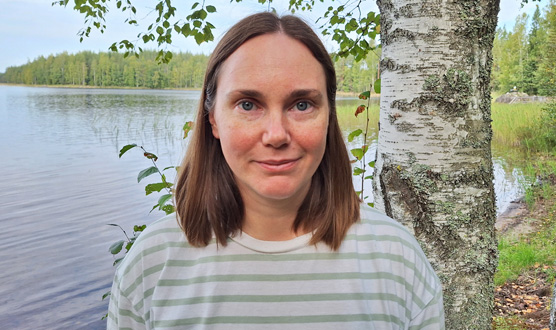
Kaisa Kraft will defend her dissertation at the University of Helsinki on Friday, September 20th. © Mikael Kraft
Syke’s researcher Kaisa Kraft will defend her dissertation at the University of Helsinki on Friday, September 20th. The dissertation examines the suitability of imaging and data processing with pattern recognition and machine learning for the Baltic Sea phytoplankton, focusing particularly on cyanobacteria. The results of the dissertation have been utilised at the Finnish Environment Institute, making it the first in the world to monitor cyanobacteria conditions with this method. In the future, similar technology could enable continuous phytoplankton monitoring in various marine areas.
Imaging and data processing of phytoplankton using pattern recognition and machine learning have revolutionised the ability to monitor changes in the composition and quantity of phytoplankton. The study developed and implemented the use of the Imaging FlowCytobot (IFCB) imaging device for observing phytoplankton in the Baltic Sea. This was the first time in the world that the device was used for bloom-forming cyanobacteria.
More accurate and efficient information about algae
The imaging method can produce information about algae communities around the clock and throughout the year. The algae species present in seawater are automatically identified from the images taken by the device, and information about, for example, cyanobacteria species is transmitted directly to researchers within two hours. The traditional microscopy-based method can only observe individual moments of algae communities, for example, once a month or even only once a year during sampling.
In the future, the method can be used to support monitoring and decision-making. It can enable more accurate marine status assessments and help understand the potential impacts of climate change on the Baltic Sea’s phytoplankton community, which is vital for the entire marine food web, oxygen production, and carbon cycling.
Phytoplankton, or microscopic algae, are an essential part of the global climate system. They account for approximately half of the World’s oxygen production and carbon fixation. However, some phytoplankton species form harmful blooms that disrupt recreational use of water bodies and are also hasardous to health, such as cyanobacteria blooms in the Baltic Sea.
More information
M.Sc. Kaisa Kraft, The Finnish Environment Institute (Syke)
firstname.lastname@syke.fi, tel. +358 29 525 1970
Kaisa Kraft will defend her dissertation at the University of Helsinki on Friday, September 20th at 1:15 PM. Address: Raisio sali (lecture room B2) in the Forest sciences building at the University of Helsinki, Viikki campus (Latokartanonkaari 7, 00790 Helsinki)
The event can also be followed remotely via live stream (video.helsinki.fi).
Dissertation: High-throughput imaging of the Baltic Sea phytoplankton community with an emphasis on bloom-forming cyanobacteria (helda.helsinki.fi)
Photo gallery of algae images taken with the IFCB device (itameri.fi, in Finnish)